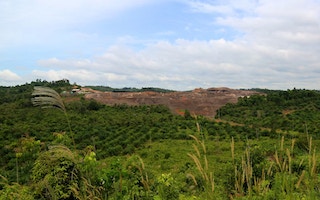Chain Reaction Research (CRR), a think tank that investigates the tropical deforestation risk of commodities such as palm oil, soy and beef, is closing after a decade of operations.
The organisation is well known in the industry for probing studies that translate sustainability risks into business risks, for instance the cost to consumer goods companies of eliminating deforestation from their supply chains and and the reputational risk of deforestation for packaged goods firm Procter & Gamble.
Since 2013, CRR has produced 375 articles and provided data that backed shareholder resolutions to strengthen the no-deforestation policies of firms including consumer goods company Unilever, meat firm Tyson Foods, and animal nutrition company Archer-Daniels-Midland.
To continue reading, just sign up – it’s free!
- Get the latest news, jobs, events and more with our Weekly Newsletter delivered to you free.
- Access the largest repository of news and views on sustainability topics.
- You can publish your jobs, events, press releases and research reports here too!
Newsletter subscribers do not necessarily have a website account. Please sign up for free to continue reading!
It is closing due to a shortfall in funding as donors try other stategies to hold deforestion-risk companies to account. A message on the organisation’s website states that CRR is “temporarily pausing activities” as it seeks further funding.
Chris Wiggs, programme director for AidEnvironment, one of the non-profit partners behind the think tank, said that the focus of CRR’s work was no longer aligned with the greatest deforestation risks, and a change in strategy was needed.
“The palm oil sector has changed massively in the last few years, with NDPE [No Deforestation, No peatlands, No Exploitation] policy uptake increasing and deforestation for oil palm in Indonesia massively declining,” he told Eco-Business.
“The deforestation that is occurring is now typically not linked to NDPE supply chains. It’s usually domestic or linked to China and South Korea,” he said. “It was felt that CRR wasn’t the best outfit for work targeting those regions, so we began scaling back the CRR palm oil work and were targeting companies via other avenues.”
In a review of current trends in forest-risk commodities, CRR researchers warned of key palm oil growth regions Africa and Latin America as potential “leakage markets” to watch for deforestation.
The review found that NDPE implementation in soy and beef in Latin America was lagging efforts in Southeast Asia, with key soy and meat companies delaying zero-deforestation target dates. However, the report pointed out that pressure to increase transparency in these sectors is mounting with the European Union’s incoming deforestation regulation.
It also found that companies and financers are now more aware of the value of deforestation risk. While upstream companies face risks such as loss of market access, stranded assets, and regulation, downstream companies – which make by far the most profits on palm oil, soy, and beef – stand most to lose reputationally from deforestation exposure.
CRR noted that despite progress over the last ten years, emerging areas of concern include a lack of cross-commodity NDPE policies – a January study found that a blind spot in corporate zero-deforestation policies enables household brands to source palm oil from Asian conglomerates that clear forests in other sectors such as mining and logging.
Other emerging threats include limited attention to social issues and exploitation in palm oil supply chains, and unintended negative impacts on climate and livelihoods from the transition from fossil fuels to biofuels.
CRR was also supported by non-profits Green Century, Climate Advisers and Profundo. Funders included the Packard foundation, Laudes Foundation, and Dutch Fund for Climate and Development.

















